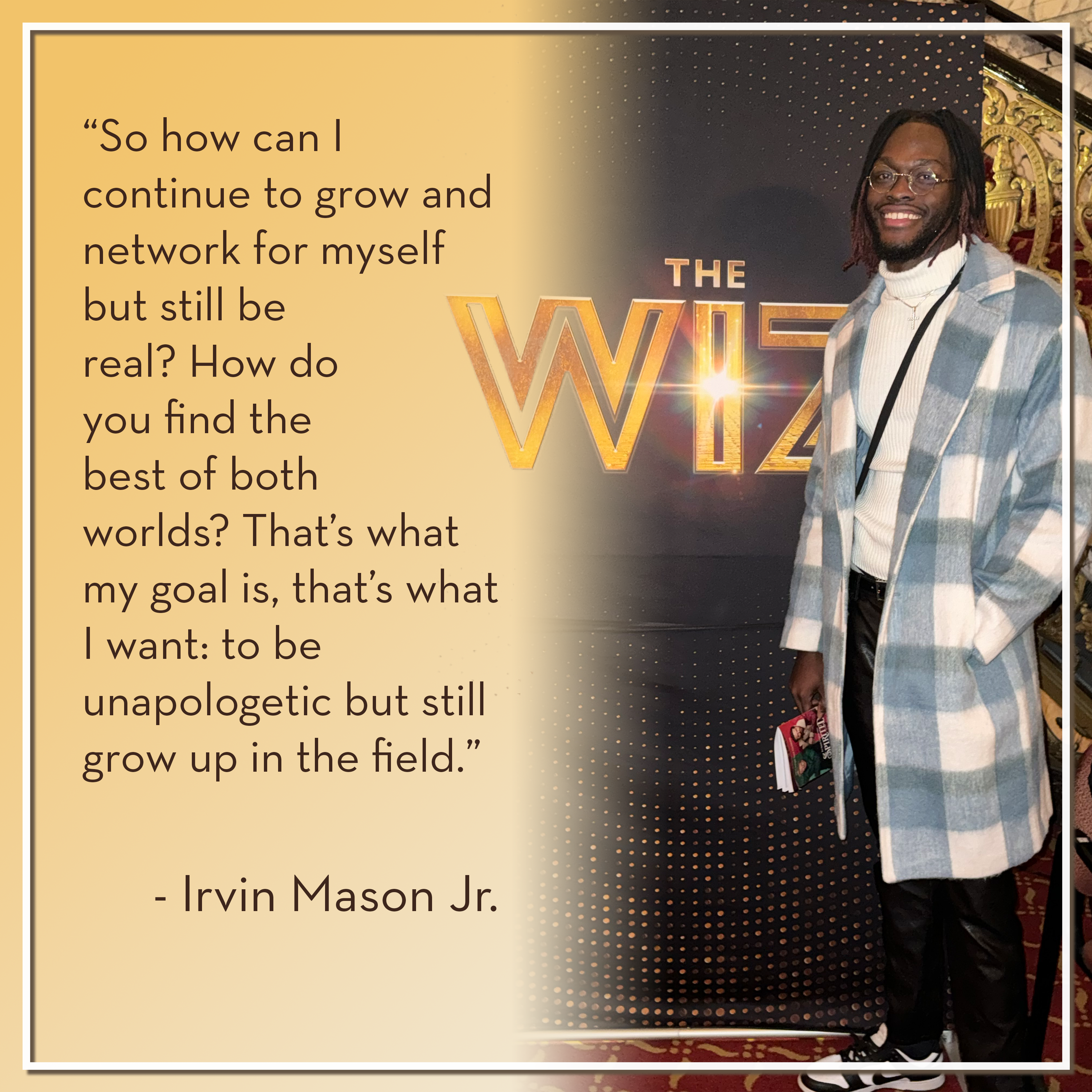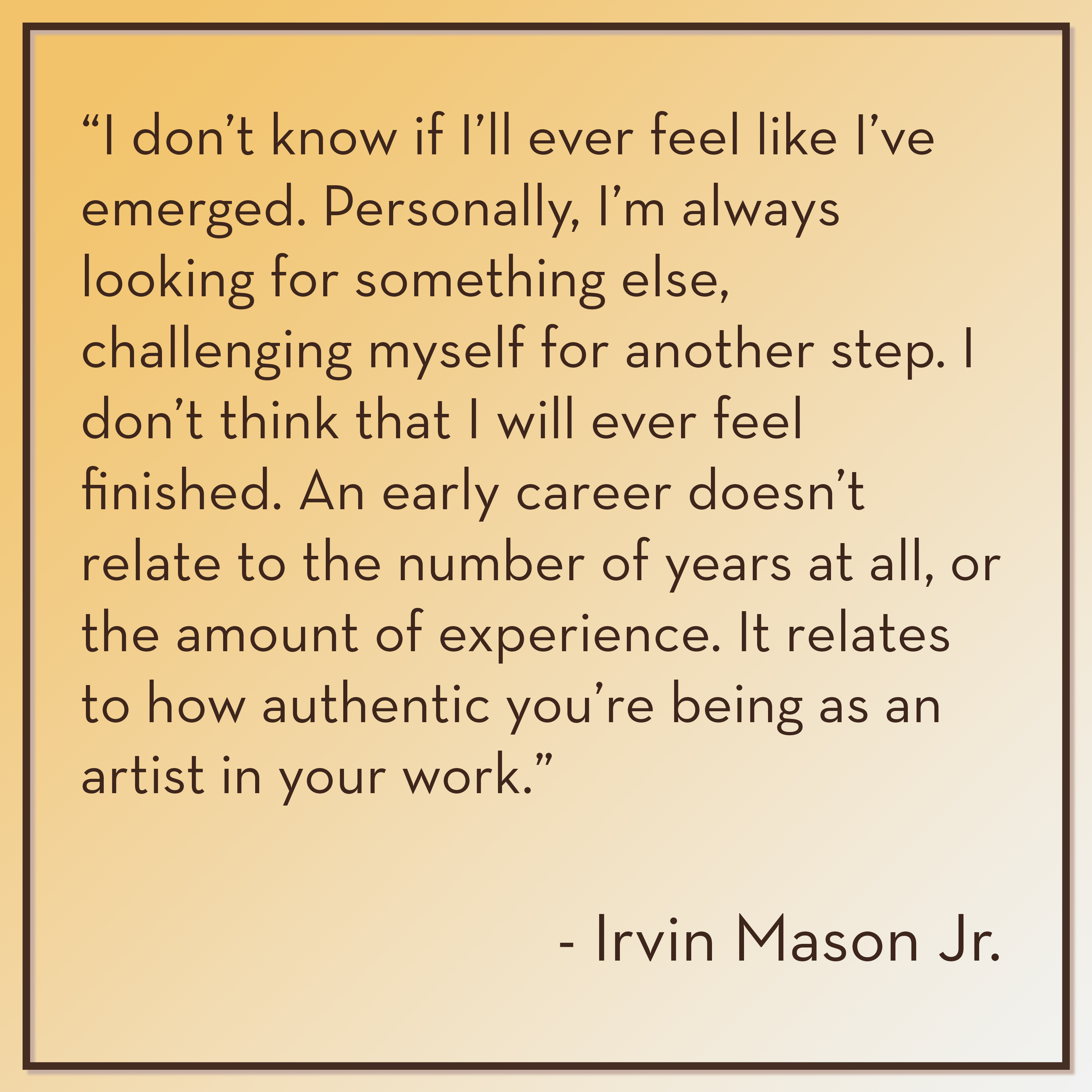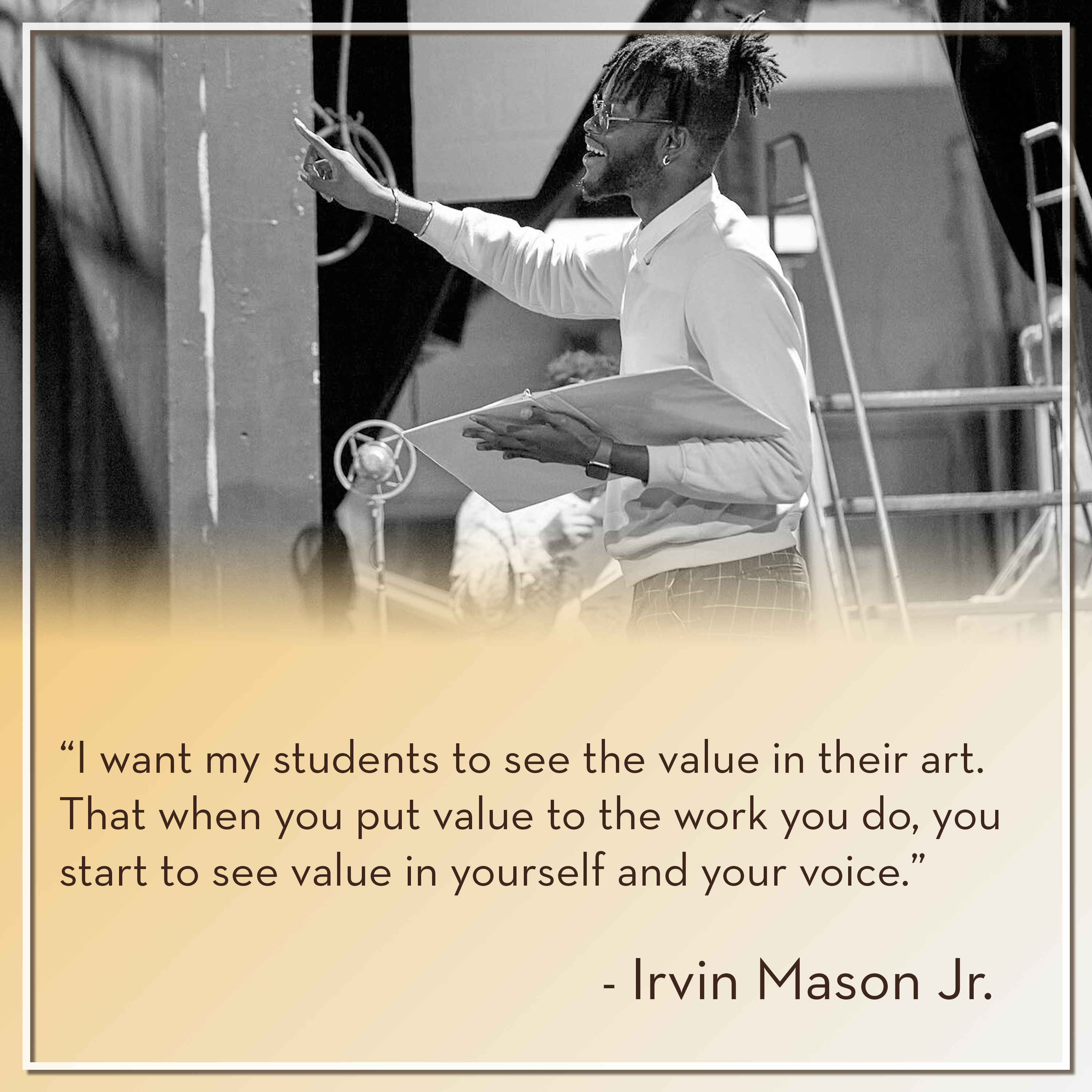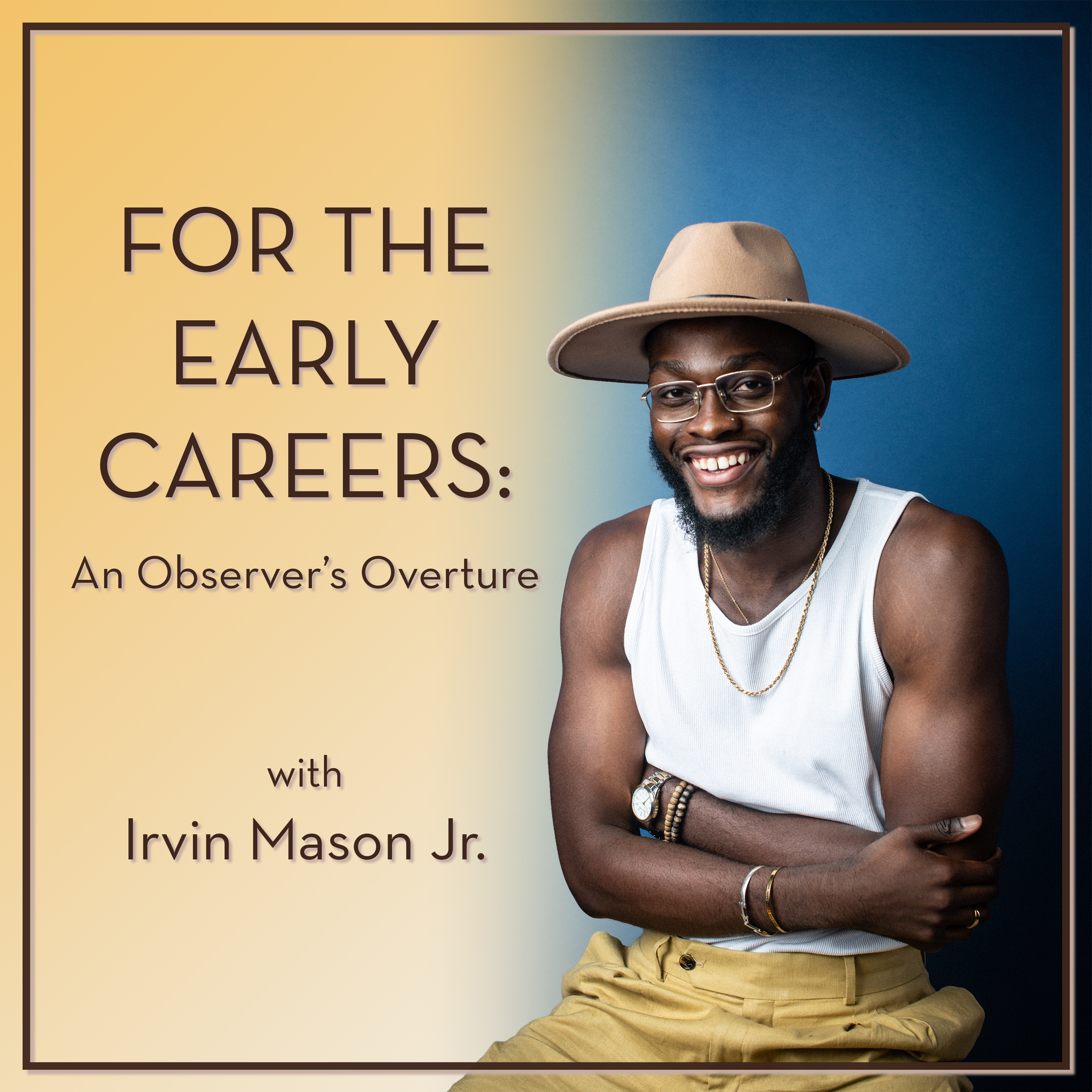As school bells rang through the halls, we caught up with high school teacher and NAMT Observership alum for Early Career Directors, Irvin Mason Jr., during his free period to ask… what does it mean to be “emerging” anyway?
NAMT:
Hello! Why don’t you introduce yourself and tell us about how you’ve gotten here so far.
Irvin Mason Jr.:
Hey y’all, I’m Irvin Mason Jr. I was born and raised in the United States Virgin Islands—St. Thomas to be exact. I’m an island boy, through and through, and that’s where I started doing theatre. I always had a love for performance. In the third or fourth grade, I directed my entire class in High School Musical, and my mom printed out a giant banner for them to run through at lunch. Then, I begged her to be in our community theater’s musical summer camp, which is where I did my first show, The Wiz, and I played the Tin Man. It was everything! I knew then that this was what I wanted to do for the rest of my life.
I was going to be a performer. I would go to auditions and get called back but wasn’t getting the parts I wanted. After about three years, I finally asked Erica Sutherlin, the director of our summer camps who would eventually become my mentor, why I wasn’t getting the lead and she told me… I couldn’t sing. That’s a big, big, big downer for someone that loves musical theatre! But she was right, I couldn’t sing for sure. However, she also said, “You do have an eye for leadership and direction.” So, from then on and for every year that I came back, she would let me do something more than just perform.
I was a stage manager in the first year. I became her assistant director, and I also did a little lighting design. I really didn’t think theatre was a career. Many Caribbean folks think that you should major in something “logical,” like to be a doctor or a lawyer or accountant, so I never considered theatre to be a realistic path for me. But during my senior year of high school, I stopped and thought, What am I good at? Like really, really good at? Or really even enjoy? I did this at school, why can’t I do this professionally? So, I went to UCLA and majored in Theater with a concentration in Directing, and I still had a passion for performing so I was acting, too. And now here I am. I’m in New York, and I’m grateful and proud of the hard work I put in over the years.
NAMT:
Can you talk to us about finding NAMT and the Observership for Early Career Directors?
IMJ:
When I applied to be part of the Observership at NAMT, it was a random search online one day. I thought, “why not do it?” And I didn’t understand—I did not know that NAMT was going to become such a root or a seed for my career as a director. It has showed me how to navigate so many different spaces in the theatre world and how to talk to producers, other directors, actors. It has allowed me to push myself out of this comfort zone—this little Early Career who doesn’t know anything in this room with all these amazing people that have accomplished all of this in their careers. Just having the confidence to speak with them, to ask them questions, to introduce myself. NAMT has been a huge asset and resource, like with the community that I’ve built with the other observers in my cohort and the staff. I love that NAMT was the first place where I built artistic community and that has only grown and given me more opportunities in directing.

NAMT:
How do you feel about the term “Early Career Director?” When are you no longer emerging?
IMJ:
I don’t know if I’ll ever feel like I’ve emerged. Personally, I’m always looking for something else, challenging myself for another step. I don’t think that I will ever feel finished. An early career doesn’t relate to the number of years at all, or the amount of experience. It relates to how authentic you’re being as an artist in your work. When you are younger in the field, you have to go with the flow a little bit. Maybe I’d be saying yes to almost everything—“Yes, I’ll do it because I need it on the résumé.” But to get to a point where I can choose what art I want to create, choose what goes on stages, say “yes” to certain things and “no” if it doesn’t align with who I am? As an artist, I’d say, “Yeah baby, you’ve emerged!” Maybe I’ll say I’m mid-career at that point. <everyone laughs>
NAMT:
Can you talk about your goals and values as an early career director?
IMJ:
I would say my goal is success for myself. The easy answer is “I want to be on Broadway,” and sure, that’s one goal. But I always ask myself, what even is the definition of success? For me, it’s not necessarily what level of work I’m doing, but instead it is about creating space for people that look like me and have been underrepresented and don’t have a voice. It’s about making unapologetic theatre. My goal is to create theatre with residue—the kind that just sticks to you. You walk out and you’re just like, “I cannot get that show off me! I can’t get that out of my mind.” So how can I continue to grow and network for myself but still be real? How do you find the best of both worlds? That’s what my goal is, that’s what I want: to be unapologetic about the work I create while still making strides in the field of theatre.

NAMT:
What’s it like to be an emerging artist? How have you made it work?
IMJ:
I like looking back at everything that I’ve done in the last year and a half and how it’s been so interconnected. It reminds you to bring your best self to a process. For instance, the first time that I had even heard of The Muny in St. Louis was at the Festival, and I made a great connection with their President Kwofe Coleman while I was a NAMT Observer. Little Shop of Horrors was the first musical I had ever seen at my community theater, so when I saw that the Stage Directors & Choreographers Foundation had submissions to be on the team, I applied and eventually got the opportunity. It was also an observership but so different from a developmental process at NAMT—we were staging an entire show in a very short amount of time. How do you stage a show, a full musical, in 12 days on a 100-foot stage? This seems impossible!
Maggie Burrows directed the production, and what I learned from Maggie was the importance, and really the skill, of planning and being organized and doing your homework before you get in the room. It takes me a while to dive into a piece, but what I observed was how preparation made her life so much easier and how collaborative she was as such. Everyone was in it, and it was beautiful to see how Maggie and her choreographer, William Carlos Angulo, were so specific and detailed in the world they envisioned. That’s the kind of art I like to create.
And it was just supposed to be Little Shop, but I really got into the mindset of meet every single person here. I figure if I’m only here for 12 days, I better talk to everyone. And I just didn’t have enough time—I really felt that I would benefit so much more if I was able to observe another process at The Muny and compare the two. So, you know, I just asked the question… and y’all… that’s my biggest advice. The worst you can get is no. I asked Tali Allen, the Education Director, and when she said I’d be able to stay until the opening night of RENT, I almost cried. I had snuck into RENT rehearsals, and I was so excited by and interested in Lili-Anne Brown, in her process, in her dramaturgy which is so strong.
I feel very much like part of The Muny family. While I was there, I met Mike Isaacson who is a producer of The Wiz, which was huge because they had announced they were taking it to Broadway, and it was so important to me. I told myself, I’m going to work on this production. I won’t say too much, but I happened upon a chance to make my case to Schele Williams, who is the director and also happens to be an alumni artist of the NAMT Festival. I told her, “If you’re looking for an assistant, an observer, someone to bring you coffee or your lunch, I’ll do anything!” She told me she already had an associate… but she’d be keen on seeing if I could observe. She looped me in with her team, and crazy enough, it was with another one of the observers from my NAMT cohort.
On the first day of rehearsal, we listened to Schele speak about all these Black creatives, actors, directors, designers, everyone in this space existing and creating a show that young Black children and anyone can come just see themselves. I’m an arts educator. I try to make theatre where my students can be reflected in the stories. She spoke about how we are a representation of the Black community, and this is a love letter to them.
That was beautiful, and honestly, it was scary. You feel like you’re this Early Career, right? I was a little Early Career, and I was going to rehearsals while I was also teaching. I was running to teach and then speeding back to rehearsal, and sometimes there were hours or days that I wasn’t there. I would think, I could be missing a great connection, a great lesson from Schele. I think I went crazy trying to keep up with all of that. What do I do? What is my purpose? But it was something that Schele said that really stuck with me: everyone in that room was beneficial to that process. And here I am, only an observer who doesn’t really say much at all, or get a say at all, but just wow! This is what I’m supposed to do. This is where I’m meant to be, you know? And in that moment. I just knew there was literally no other career for me. No other place where I belong.
The Festival director that I observed was Rachel Klein. I then assisted her Off-Broadway on The Gospel According to Heather between my time at NAMT and The Muny. That was something I never expected, and it was nerve-wracking to be in the room trusting myself with the NAMT basics on an Off-Broadway show. You know exactly what needs to get done, it’s just different work. It was so full circle and it’s so good to know that I have those tools already in me and mentorship around me.

NAMT:
What do you think your goals and ambitions will be as an emerged director?
IMJ:
What I really want is to establish my career to the point where I could go back to St. Thomas and the Virgin Islands and open my own performing arts high school. For music, for theatre, for dance, for all of it. The Caribbean is home to so much freaking talent. It’s insane. But like me, so many have no idea it could be a profession, so I want to have my own place to cultivate that talent and show those young scholars how to make it a career. I want to educate parents and adults in the Caribbean about how you can make it a me—you can go to school, major in it, work in it in so many places. I want my students to see the value in their art. That when you put value to the work you do, you start to see value in yourself and your voice.
I am manifesting. What I will say is that things are really moving into a place where I am excited to have jumped out on faith and allowed myself to immerse in this world. As I continue to grow as a professional director and move into new opportunities, I want to continue to find time to work with young creatives. I love watching youth grow into themselves and art—it’s taught me more about how I communicate, because students, teachers, actors, directors… it’s all a creative team.



2 Responses to “For the Early Careers: An Observer’s Overture with Irvin Mason Jr.”
Arah Lockhart
Great interview Irvin. Blessings for continued success and growth. Forever proud of you!🤩🙏🏾
Gigi Bolt
Wonderful interview!!